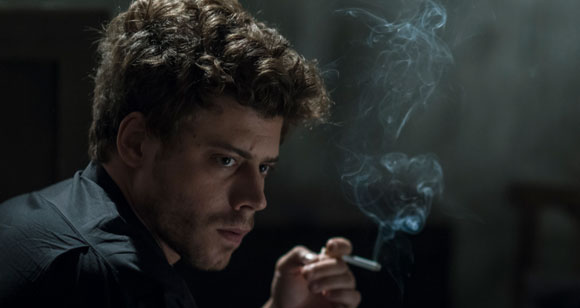 It’s always a pleasure to find a movie that you know absolutely nothing about beforehand and it proves to be a really fine piece of work. That was true of The Man Who Was Thursday. The film which had its world premiere at the recent Edinburgh International Film Festival is based on a novel of the same name, from 1908, by English author G.K. Chesterton.
It’s always a pleasure to find a movie that you know absolutely nothing about beforehand and it proves to be a really fine piece of work. That was true of The Man Who Was Thursday. The film which had its world premiere at the recent Edinburgh International Film Festival is based on a novel of the same name, from 1908, by English author G.K. Chesterton.
Father Smith is a priest with a murky past. He has been in trouble with his superiors at the church in the past and is now living and operating in an inner city parish in the USA. After doing what he seemed to be the right thing in a situation regarding a fallen woman of his parish he finds himself at the centre of a scandal and is sent off to Rome for a rehabilitation course to straighten him out and bolster his faith. He is no sooner there than he is co-opted into a scheme to uncover the leader of an anarchists collective who are determined to bring down the Catholic church in the most spectacular way. As Father James enters this murky world the bounds of his sanity are stretched and he has difficulty telling reality from the disturbing visions he is experiencing.
What made this film so enjoyable was the way the story was presented to the audience. We see everything from the viewpoint of Father James and we know only what he knows. This means that we are as much in the dark as he is. There is little in the way of exposition from the other characters. To have them do so would only have spoiled the outcome. This strategy makes a second viewing of the film as much of a pleasure as the first.
The film was adapted from the a short story that was set prior to the first world war. In updating it, the focus was moved from communist agitators to the modern Catholic Church. What it retained was the main thread of the story with a man going undercover in order to find the truth and the basis of the secret organisation.
 In order for the audience to go along with the premise and the twisting story line they have to believe in the principal character of Father Smith. Francois Arnaud is very good as the troubled priest. He comes across as being nervous and agitated most of the time. You get the sense that he could crumble at any time and it is taking all of his strength just to make it through the day. There are scenes where he appears to travel to war time Rome which avoid the predictable performance cliches. Arnaud’s anxieties never feel forced or over the top.
In order for the audience to go along with the premise and the twisting story line they have to believe in the principal character of Father Smith. Francois Arnaud is very good as the troubled priest. He comes across as being nervous and agitated most of the time. You get the sense that he could crumble at any time and it is taking all of his strength just to make it through the day. There are scenes where he appears to travel to war time Rome which avoid the predictable performance cliches. Arnaud’s anxieties never feel forced or over the top.
Of course for the principal performance to work there has to be a strong support. All of the characters around him, especially Charles (Jordi Molla) and Saturday (Ana Ulura), are given depth to their roles without forcing them into plot devices that Father James has to interact with. It is a combination of the actors skill and the strength of the screenplay that pull it off.
The majority of the film occurs in Rome and it is represented well on screen. From the rather dingy surroundings of the bar that Father Smith frequents to the oppressive churches at night, the city and surroundings play an important role in the building of the tension. With the history of the church, in terms of the buildings and the centuries of intrigue surrounding the religion, it creates an impressive atmosphere.
Overall, a tight and twisty thriller that keeps you engaged.
- Arrow Video Titles For March 2025 - January 5, 2025
- G20 – Preview - January 5, 2025
- Royal Opera House launches Maria Callas tour featuring Angelina Jolie’s costumes from new biopic Maria - January 5, 2025




